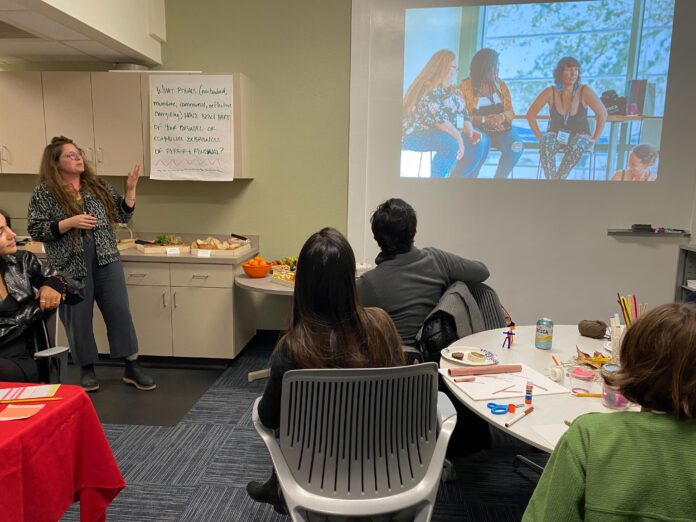Community is at the forefront of Imagining America’s Mail Art Project and annual National Gathering
By MARIA MARTINEZ CASTRO — features@theaggie.org
In addition to being home to some of the world’s top scientific research, UC Davis also hosts Imagining America, a consortium of diverse individuals working in the humanities and across disciplines to nurture better communities and create a better future.
“Imagining America is one of several different professional associations with a strong focus on community engagement,” said the membership director for Imagining America Trina Van Schyndel. “In particular, we’re really interested in how universities and the individuals that work in universities, whether they’re faculty, staff or students, engage with and work alongside community members and community organizations to address important social, environmental [and] economic issues.”
As a group, Imagining America calls on people’s unique senses of creativity and encourages them to harness those tools and interests to promote community engagement and social change.
“We’re very interested in folks who see the value and are interested in the methods that come from the arts or the humanities or the design fields,” Van Schyndel said. “I think that’s kind of what makes us unique across these multiple associations that all focus on community engagement.”
Ariana Abtahi, a fourth-year communication major and social media intern at Imagining America, shared why she believes having an art- and humanities-based hub tackling current and pressing social issues is important.
“I think that Davis has a lot to be proud of in terms of research [and] obviously leading in vet sciences,” Abtahi said. “But I do think that sometimes that can lead students who are in the humanities programs to feel not as important or not as heard […] It can lead to people not thinking that they’re enough to be where they are at Davis. A whole institution that is for those who study [the humanities] provides a safe space for not only the communities they want to help but for the people who are part of it to know that they’re heard [and] their work is appreciated.”
Marisa Raya, a second-year Ph.D. student in the Geography Graduate Group and an Imagining America PAGE (Publicly Active Graduate Education) Fellow, said that Imagining America’s focus on social change through community engagement has been important to her academic and professional journey.
“I’ve always tried to seek out better ways of elevating disadvantaged community voices in government,” Raya said. “Part of my Ph.D. research, which is on land reparations and land use in California, revolves around how different communities define land reparations and land access and property rights. I really wanted to have an academic home and a group that prioritized community engagement as the driving force behind our research. And I wanted to be connected to a cohort of other fellows, as well as the scholars who are affiliated with Imagining America.”
Both Abtahi and Raya attended Imagining America’s annual National Gathering, an event during which individuals share and celebrate their findings, personal paths and art to promote community and social progress. This year, the National Gathering took place in New Orleans from Oct. 14 to 16. The theme was Rituals of Repair and Renewal.
“That was a very transformative weekend for me,” Abtahi said. “I was only there for four or five days, but I left a different person. And I’m not just saying that, I really did learn so much.”
Raya said that the National Gathering inspires attendees to create their own unique ways of sharing and building knowledge to work toward a more just society.
“I think probably the part that was most eye-opening was [that] the types of engagement showcased at the conference are very often not determined by a western United States perspective or a white hegemonic perspective,” Raya said. “There’s engagement through music, through listening to the land, through art or clay […] That was really exciting, to have all of these different forms of engagement and knowledge production recognized.”
Inspired by the theme of this year’s National Gathering, Rituals of Repair and Renewal, Imagining America is hosting its second Mail Art Project. Registration to participate in the Mail Art Project is open from Nov. 10 to Dec. 16. Participants will then have until April to create their art pieces. The Mail Art Project encourages participants, as they create their art, to reflect on the question: “What rituals (embodied, mundane, communal, reflective, energizing) have been part of your personal or communal experiences of repair and renewal?”
From April 15 to 30 in 2023, participants will submit photos of their art in addition to a description and their reflections. The artistic efforts and participation of community members will be showcased and celebrated online by June 2023.
“I’ll just share a quote that I think really gets at, ‘Why now, why this topic?’” Van Schyndel said. “The quote is from bell hooks … ‘Rarely, if ever, are any of us healed in isolation. Healing is an act of communion.’ I think this idea of healing was an important one. Whether we’re talking about healing from the trauma of the pandemic, healing from the racial violence across multiple racial groups […] there’s been a lot of trauma that folks have experienced over the last several years. It felt important to think about the ways we are trying to heal.”
UC Davis staff, students and community members are all welcome to participate in the Mail Art Project. According to Van Schyndel, the event is an opportunity for people to engage with art with a collective goal of community healing and growth.
“I think it’s important for us to tap into the creative parts of ourselves,” Van Schyndel said. “Art-making as a way of generating new knowledge, new insights, new reflections about a topic is really powerful.”
Written by: Maria Martinez Castro — features@theaggie.org




